A new plan to deal with the flood-stricken Somerset Levels will be drawn up within six weeks, the environment secretary, Owen Paterson, has announced during a visit to one of the worst-hit areas.
Paterson said the under-fire Environment Agency, which has been heavily criticised by local people and politicians for not dredging the area's rivers, and local councils would come up with a new scheme to alleviate flooding.
He said this would "almost certainly" involve a plan to clear the Parrett and Tone rivers, which residents say have not been properly dredged over the past 20 years.
However, Paterson provoked anger when he chose not speak to local people during a visit to a pumping station on the levels next to the Parrett.
"Who has he actually spoken to? He's spoken to nobody," said the local farmer and police community support officer Becky Riley. "We've got the farmers here, members of the public who live here. He's not listened to people. It's not on, it's not right. People are fuming."
Riley runs North Moor Farm with her partner, James Hall. Like almost all local people, Hall said the river urgently needed to be dredged. "They have done nothing with the river for the last 20 years," he said.
Around 90% of North Moor Farm is underwater. Hall said the grass would be dying under the floods – and the cold snap that is expected would exacerbate the stress the land is under. He said he and his father, who is based nearby at Wisteria Farm, had reduced the size of their cattle herds this year in anticipation of the floods.
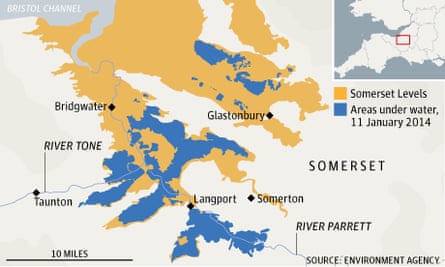
"You begin to wonder if it is worth it," he said. "Farming is all about handing the business down to future generations. But I'm not sure there is going to be anything to hand down."
Members of the Flooding on the Levels Action Group (FLAG) failed to get a word with Paterson. They remain to be convinced that things will really change. Bryony Sadler said: "We've had no answers. It's nice and tidy down here today because the minister is here but that's no good for us locals who live amongst all of it. There's no change. We needed to see this three weeks ago. We did ring them, we asked them to bring the pumps in, to get things moving but they didn't listen.
"Life is stressful, exhausting, worrying. You have blue flashing lights outside your houses because we're an incident. It's really hard. We live in the countryside. It's quite scary."
Sue and Phil Crocker, who retired to the Levels, said the responsibility – and money – for dredging ought to be put into the hands of those who knew the ground best, the local people. Mr Crocker said Paterson should have been in the area a fortnight or three weeks ago.
"It's the same as last year. They were a fortnight too late getting the pumps going. The guys on the ground are brilliant but they are not allowed to do things as quickly as they want to.
"The rivers do need dredging but it's not only that: it's the whole infrastructure of the waterways. You need to go back to the local system when local people who knew the ground actually did the work."
Many locals said they had never known the flooding this bad. One farmer, Rebecca Horsington Graham, who has lived here all her life, said outsiders did not understand how the Levels worked.
"A lot of people don't realise this river system is totally manmade," she said. "It was first manmade about 800 years ago. Because it was put in by man it needs to be maintained by man. The Environment Agency keeps saying that we can't stop the flooding. We all understand that. We know we are going to be flooded every so often and that's fine. But we shouldn't be flooded for months on end."
The Bridgwater MP, Ian Liddell-Grainger, firmly blamed the Environment Agency for the problems on the Levels. He accused the agency of being more concerned with protecting flora and fauna than people and said the floods were the worst people could remember.
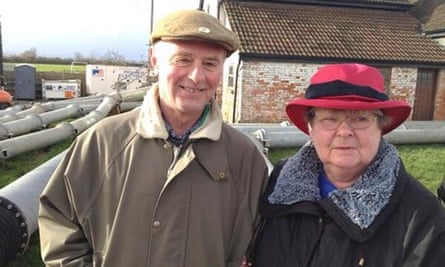
"This never flooded to this level ever in living memory, and we've got people who have been here for a long time. If you look back into the mists of time you don't have this."
David Cameron defended the agency, saying it had done "excellent work on helping to deal with the flooding and helping with communities". But he told BBC's Today programme the agency had to listen to the concerns raised in Somerset.
"Obviously the Environment Agency has to listen to these concerns – you do get quite widespread concerns that river levels have risen.
"We have got to address those and give some clear answers."
Speaking to the television cameras rather than the locals who had hoped to meet him, Paterson acknowledged there was legitimate anger felt among politicians, farmers and residents on the Somerset Levels.
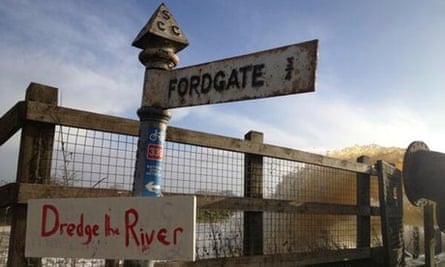
He said: "They are quite right to be angry, it's absolutely legitimate and that's how our political system works and that's why the two local MPs have brought this to my attention. That's why I convened the meeting of the experts last night. That's why I led the meeting this morning with the local councils, and that's why I hope we will have a very clear action plan presented to me in six weeks' time so that I can make a categoric decision once and for all, but then long term look to see how, with partnership funding, local agencies such as the internal drainage boards, the county council, the four district councils can work together – and with the NGOs, people like the RSPB and the Wildlife Trusts, who play a real role in this – to see how we can hold water back further up in the hills, how we can do more with sustainable urban drainage systems [Suds], get more water soaked into the ground before it gets into the river systems and also long-term planting."
Another option being considered was a sluice near Bridgwater to keep the sea tides out of the river network on the Levels.
He said: "All that together is a long-term serious plan which I hope will give us satisfactory results here over the next 20 years."
On the decision to stop regular dredging of the Parrett and the Tone, Paterson said: "Quite clearly the national guidelines do not appear to me to be appropriate for this very particular part of England, where you have got about 100 square miles well below sea level, which was cleared by the Dutch way back under Charles I and where very active management of the waterways is required."
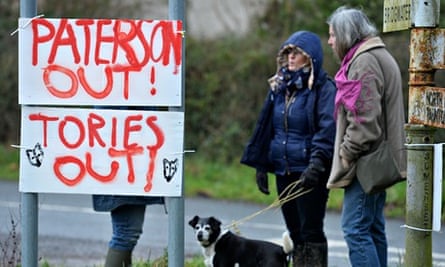
But the leader of Conservative-led Somerset county council, John Osman, expressed disappointment that there would be no immediate extra funding to protect flood-hit communities across the county.
He said: "Although I am hugely disappointed that central government have not announced any additional funding, we will continue to keep the pressure on to secure a fair deal for Somerset's residents," Osman said.
Meanwhile, the Met Office said the counties of Hampshire, Dorset and Somerset remained at medium risk of flooding as another day of rain hit the regions.
Snow was expected to fall across high ground throughout the UK, particularly across Wales, Scotland and northern England, with some hail storms and thunder predicted.
Temperatures will fall to around freezing, resulting in a risk of icy stretches on roads and the potential for travel disruption, the Met Office added.


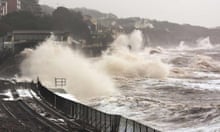
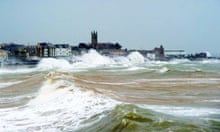



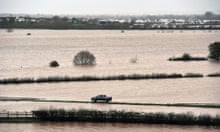
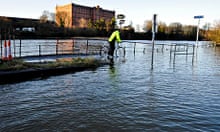
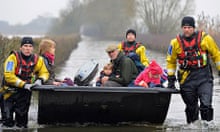
Comments (…)
Sign in or create your Guardian account to join the discussion